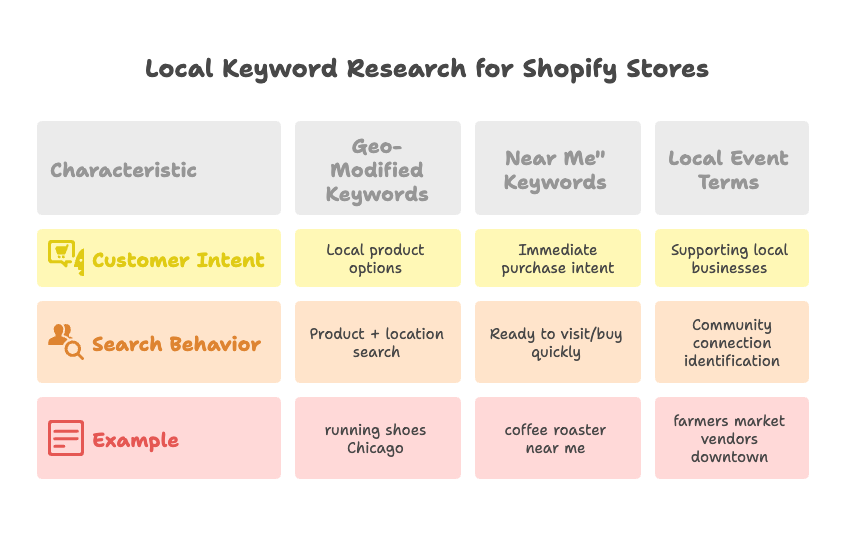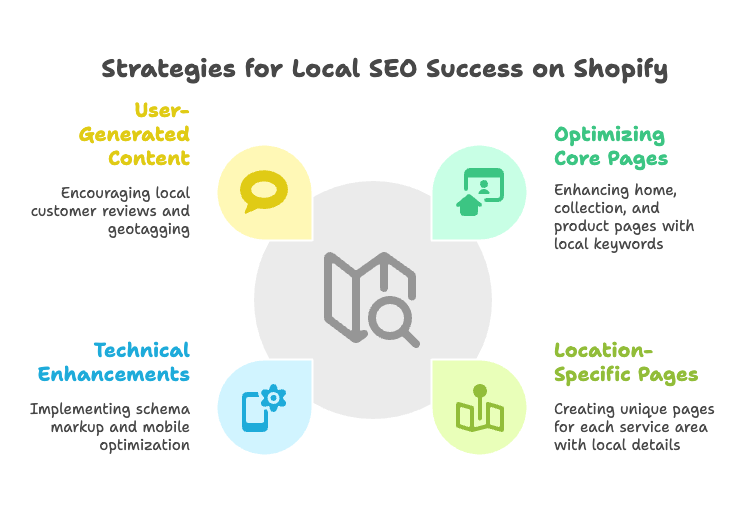Picture this: a potential customer searching “handmade jewelry near me” on their phone while walking through downtown. They’re ready to buy. The question is—will they find your Shopify store?
Local search isn’t just a nice-to-have anymore. It’s become the bridge between online discovery and real-world purchases, especially for Shopify store owners who understand that proximity often trumps price in the customer’s mind. Nearly half of all Google searches carry local intent, and here’s the kicker—most mobile local searches result in either store visits or immediate purchases within 24 hours.
But here’s where it gets interesting for Shopify merchants. Your platform supports both digital-first brands and brick-and-mortar retailers, creating unique opportunities that most e-commerce guides completely miss. Whether you’re running a boutique clothing store with a physical location or an online jewelry brand targeting specific metropolitan areas, local keyword research can transform how nearby customers discover and connect with your business.
In this guide, you’ll discover how to identify the exact local search terms your potential customers use, implement them strategically across your Shopify store, and measure the results that matter most to your bottom line. We’ll cover everything from foundational keyword research techniques to advanced automation strategies that save time while boosting your local visibility.
Why Local Matters in Shopify E-commerce
Local search has evolved far beyond simple “near me” queries. Today’s shoppers use sophisticated search patterns that blend product intent with geographic specificity. They’re searching for “vintage leather bags Chicago” or “organic skincare Brooklyn” because they want products and they want them from businesses they can trust and potentially visit.
For Shopify store owners, this represents a massive opportunity. Your platform naturally supports both online sales and local pickup options, but most merchants miss the chance to capture high-intent local traffic. These searchers aren’t just browsing—they’re ready to buy, often with higher conversion rates than general e-commerce traffic.
The competitive landscape makes this even more compelling. While large retailers dominate broad product searches, local search levels the playing field. A well-optimized local jewelry store can outrank national chains for “engagement rings [city name]” because Google prioritizes local relevance and authenticity.
Unique Needs of Shopify Store Owners
Shopify merchants face distinct challenges that generic SEO advice doesn’t address. You’re not just competing with other e-commerce stores—you’re competing with local businesses, national brands, and marketplace sellers all at once.
Your success depends on understanding how local keyword research bridges online discovery and offline transactions. A customer might discover your store through a local search, browse your products online, then visit your location or choose local pickup. This customer journey requires a different approach to keyword targeting than traditional e-commerce optimization.
Additionally, Shopify’s built-in features like store locators, local pickup options, and multi-location support create unique opportunities for local SEO that many merchants never fully leverage.
Local Keyword Research: Foundational Principles for Shopify Stores
Understanding local keywords means thinking like your customers think. They don’t just search for products—they search for solutions within their geographic reality.

Understanding Local Keywords for E-commerce
Local keywords fall into three main categories, each serving different customer intents and search behaviors.
Geo-modified keywords combine your products with specific locations. Think “running shoes Chicago” or “wedding dresses Austin.” These searches indicate customers who want your products but prefer local options. They’re often willing to pay more for local availability, faster shipping, or the option to see products in person.
“Near me” and related intent keywords represent immediate purchase intent. When someone searches “coffee roaster near me” or “jewelry store close by,” they’re often ready to visit or buy within hours. These high-conversion searches require different optimization strategies than traditional product keywords.
Local event or neighborhood-specific terms tap into community connections. Searches like “farmers market vendors downtown” or “boutiques in Pearl District” show customers who identify with specific areas and prefer supporting local businesses.
Aligning with Shopper Intent
The customer journey for local searches differs significantly from general e-commerce browsing. Understanding these differences helps you choose the right keywords and create content that matches search intent.
Informational searches often start broad: “best vintage stores in Seattle.” Customers are researching options, comparing stores, and building their consideration set. Your content needs to establish authority and provide helpful information about your products, location, and unique value proposition.
Navigational searches become more specific: “vintage clothing Capitol Hill Seattle.” Customers know what they want and approximately where to find it. Your optimization should help them discover your specific store and understand why you’re their best option.
Transactional searches show immediate intent: “vintage leather jacket Seattle buy now.” These customers are ready to purchase. Your optimization should remove friction, showcase availability, and make purchasing as simple as possible.
Tools and Methods for Shopify-Focused Keyword Discovery
Effective local keyword research requires combining traditional SEO tools with Shopify-specific insights and local market understanding.
Google Keyword Planner, Google Trends, and Answer the Public provide foundational data about search volume and trends. But for local research, you need to dig deeper. Set your location targeting to specific cities or regions where you want to attract customers. Look for seasonal patterns that might affect local search behavior—summer outdoor events, holiday shopping patterns, or back-to-school timing.
Google Trends becomes particularly valuable for understanding local search patterns. You can compare how different cities search for your products and identify emerging local trends before your competitors notice them.
Shopify-specific keyword tools offer insights that generic SEO tools miss. Shopify’s built-in analytics show you which search terms customers use to find products within your store. This internal search data often reveals local terms customers associate with your products.
Third-party tools like SEMrush, Moz, or Ahrefs help you analyze competitor keywords with geographic intent. Look for competitors who rank well for local searches and study their keyword strategies. Often, you’ll discover local terms or neighborhoods you hadn’t considered targeting.
Manual research techniques provide insights that automated tools miss. Google’s autocomplete suggestions change based on your location, revealing how people in your area actually search. Type your main product keywords followed by your city name and see what suggestions appear.
Local directories like Yelp, Yellow Pages, or city-specific business listings show you how other businesses describe their products and services. Customer reviews on these platforms often contain the exact phrases local customers use to describe what they’re looking for.
Implementing Local Keywords on Shopify: Practical On-Site Strategies
Implementation separates successful local SEO from wishful thinking. Your Shopify store structure offers specific opportunities to integrate local keywords naturally and effectively.

Optimizing Core Shopify Pages with Local Keywords
Your home page sets the tone for local relevance. The H1 tag, meta title, and description should clearly indicate your geographic focus without sounding forced or unnatural. Instead of “Premium Jewelry Store,” consider “Handcrafted Jewelry in Portland | [Your Store Name].”
Collection pages offer excellent opportunities for local optimization. If you carry products particularly relevant to your local climate, culture, or lifestyle, highlight those connections. A Seattle clothing store might emphasize rainwear collections, while a Miami boutique could focus on lightweight, breathable fabrics.
Product pages benefit from subtle local integration. Customer testimonials mentioning your city, local delivery options, or regional size preferences all provide natural opportunities to include location-based keywords without compromising the shopping experience.
Location-Specific Landing Pages
Dedicated location pages serve customers who search for businesses in specific areas. If you serve multiple neighborhoods or cities, create unique pages for each location. These shouldn’t be thin content—each page should provide genuine value about shopping with you in that specific area.
Include practical information like store hours, parking availability, public transportation access, and nearby landmarks. Embed Google Maps and provide clear directions. Showcase local promotions, community involvement, or partnerships with other local businesses.
Most importantly, include unique content for each location. Duplicate content across location pages hurts your SEO and provides no value to customers. Write unique descriptions of each area, local customer testimonials, or content about local events where you participate.
Technical and Content Enhancements for Local SEO
Local business schema markup helps search engines understand your business details and display them in search results. Shopify apps can simplify this implementation, or you can add the code manually to your theme. Include your business name, address, phone number, operating hours, and service areas.
Mobile optimization becomes critical for local search success. Most “near me” searches happen on mobile devices, often by customers who are already out and about. Your site must load quickly and provide an excellent mobile experience. Test your checkout process on mobile devices and ensure local information like store addresses and phone numbers are easily clickable.
Leveraging User-Generated Content and Reviews
Customer reviews containing location references provide authentic local content that search engines value highly. Encourage customers to mention your city or neighborhood in their reviews. You might include a gentle prompt like “Tell other [City Name] shoppers about your experience” in your review request emails.
Geotagging your content signals local relevance to search engines. When you post photos of products, events, or store activities on your blog or social media, include location tags. This simple step reinforces your local presence and can help your content appear in location-based searches.
Off-Site and Directory Optimization for Shopify Stores
Your Shopify store’s local SEO success depends as much on what happens off your website as on it. Local search algorithms consider your presence across the entire web ecosystem.
Google Business Profile and Third-Party Listings
Google Business Profile (formerly Google My Business) acts as your local search command center. Complete optimization goes far beyond basic business information. Upload high-quality photos regularly, showcase your products, and keep your business hours updated, especially during holidays or special events.
The products section of your Google Business Profile should mirror your most popular Shopify inventory. Link directly to specific product pages when possible. This connection helps customers move seamlessly from Google search results to your store.
Consistent NAP (Name, Address, Phone Number) information across all platforms signals credibility to search engines. Even small discrepancies—like using “St.” on one platform and “Street” on another—can confuse algorithms and hurt your local rankings.
Building Accurate Local Citations and Directory Listings
Local citations act as votes of confidence for your business. Submit your store details to major platforms like Apple Maps, Yelp, and Bing Places, but don’t ignore industry-specific directories. Fashion retailers might benefit from style-focused directories, while home decor stores could list in design and lifestyle platforms.
Quality matters more than quantity. A few high-authority, well-maintained listings provide more value than dozens of low-quality directory submissions. Focus on platforms where your customers actually search for businesses like yours.
Local Link Building and Partnerships
Local link building creates relationships that benefit your business beyond SEO. Partner with complementary local businesses for cross-promotions. A jewelry store might partner with wedding planners, while a clothing boutique could collaborate with local photographers or salons.
Community involvement provides natural opportunities for high-quality local links. Sponsor local events, participate in charity drives, or host workshops related to your products. Local news coverage and event listings often result in valuable backlinks from authoritative local websites.
Guest blogging for local publications or business organizations establishes your expertise while building local authority. Write about trends in your industry, share business insights, or provide helpful tips related to your products.
Advanced Shopify Tactics: Local Landing Pages, Store Locators, and Automation
Scaling your local SEO efforts requires strategic automation and advanced Shopify features that many merchants overlook.
Creating Location-Specific Landing Pages at Scale
Multi-location businesses face unique challenges in local SEO. Each location needs unique content and optimization, but creating individual pages manually becomes impractical beyond a few locations.
Shopify’s multisite features or specialized apps can help manage location-specific content at scale. However, avoid template-based content that simply swaps city names. Each location page should provide genuine value specific to that area.
Consider creating content around local events, partnerships, or community involvement for each location. This approach provides unique content while strengthening local community connections.
Implementing Store Locator Tools and Enhancements
Interactive store locators improve user experience while providing SEO benefits. Shopify apps can create sophisticated store locators that integrate with Google Maps and provide detailed location information.
Advanced store locators can filter by product availability, services offered, or special features. This functionality helps customers find exactly what they need while providing more opportunities to include local keywords naturally.
Automation of Local SEO Tasks
Automation helps maintain consistent local SEO efforts without overwhelming your team. Review management apps can automatically request reviews from customers and monitor your online reputation across multiple platforms.
Citation management services monitor your business information across hundreds of directories and alert you to inconsistencies. While these services require investment, they save significant time and ensure accuracy across your local presence.
Measuring Success and Continuous Optimization
Local SEO success requires ongoing measurement and refinement. The metrics that matter most depend on your specific business goals and local market dynamics.
Monitoring Local SEO Performance
Track organic traffic from local searches using Shopify’s analytics tools. Segment your traffic by location to understand which areas drive the most valuable customers. Look beyond just visitor numbers—focus on conversion rates and average order values from different geographic regions.
Google Business Profile insights show how customers find and interact with your business listing. Monitor metrics like search visibility, website clicks, direction requests, and phone calls. These interactions often lead to sales that might not be immediately trackable through traditional e-commerce analytics.
Local ranking positions require specialized tracking tools. Monitor your rankings for key local keywords in the specific geographic areas you serve. Remember that local search results can vary significantly even within the same city.
Iterative Improvement of Local Keyword Strategy
Local search trends evolve as neighborhoods change, new competitors enter the market, and customer behavior shifts. Regular keyword research helps you stay ahead of these changes.
Seasonal events, local festivals, or economic changes can create new keyword opportunities. A store near a college campus might see different search patterns during the academic year versus summer break.
Customer feedback provides insights into how people actually talk about your products and location. Mine your customer service conversations, social media mentions, and reviews for language patterns that could inform your keyword strategy.
Common Pitfalls and Advanced Best Practices
Local SEO mistakes can harm your search visibility and customer experience. Understanding these pitfalls helps you avoid common traps while building sustainable local authority.
Avoiding Over-Optimization and Keyword Stuffing
The temptation to stuff local keywords into every possible location can backfire quickly. Search engines have become sophisticated at detecting unnatural language patterns, and customers notice awkward phrasing immediately.
Natural language always wins. If you can’t read your content aloud without stumbling over keyword placements, your optimization has gone too far. Focus on creating genuinely helpful content that includes local keywords where they naturally fit.
Aligning Online and Offline Branding for True Local Authority
Consistency between your online presence and physical experience builds trust with both customers and search engines. Your store’s atmosphere, customer service, and community involvement should reinforce the brand image you project online.
Train your staff to encourage online reviews and social media engagement. Customers who have positive in-store experiences are often happy to share them online, but they need gentle encouragement and clear instructions about where to leave feedback.
Conclusion & Next Steps
The Competitive Advantage of Local SEO for Shopify Stores
Local keyword research and implementation create sustainable competitive advantages that large retailers struggle to replicate. Your local connections, community involvement, and geographic relevance provide natural barriers to competition.
Enhanced visibility in local search results leads to higher-quality traffic with stronger purchase intent. Customers who find you through local searches often become loyal advocates who value supporting local businesses.
Action Plan for Shopify Store Owners
Start with an audit of your current local presence. Search for your business using various local keyword combinations and note where you appear (or don’t appear) in search results. Check your Google Business Profile, major directory listings, and competitor analysis.
Develop a local keyword map that connects specific search terms to pages on your Shopify store. Prioritize high-intent keywords that align with your most profitable products and services.
Implement your optimization systematically, starting with your most important pages and expanding gradually. Monitor your results, gather customer feedback, and refine your approach based on what works best for your specific market and customer base.
Local SEO success builds momentum over time. Consistent effort, authentic community engagement, and genuine value creation will establish your Shopify store as a trusted local authority that customers actively seek out and recommend to others.
References
- Shopify. (2025). Ecommerce Keyword Research Guide: Tips and Strategies for 2025.
- Shopify. (2024). Local SEO: What It Is and How To Do It.
- Search Engine Land. (2025). Local Keyword Research: Boost Local SEO with the Right Terms.
- AdNabu Blog. (2025). How To Do Keyword Research For Your Shopify Store.
- Refindable. (2025). Guide to Local SEO strategies for Shopify stores.
Ready to supercharge your Shopify store’s local visibility and conversion rates? Growth Suite is a free Shopify app that helps optimize your discount strategies to convert more local traffic into paying customers. With smart behavioral tracking and personalized offers, Growth Suite ensures you’re not just attracting local searchers—you’re converting them effectively while protecting your brand’s premium image. Install it with a single click and start seeing results from your local SEO efforts!




